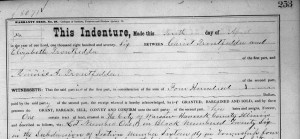 From a reader:
From a reader:
“My ancestors came into possession of farmland in Indiana circa 1815. A portion of that original land has been passed to me and I am a current owner – and nonresident farmer. I would love to identify the start of this land ownership and the subsequent transfers by will or otherwise – no family exists today to ask. Do you have any recommendations for me on how to begin and what records to begin with? I have some particulars on land ID numbers, etc., but that’s about it.”
Since the land is still in the family, the number of transfers should not be all that great and would probably have been done by either a deed or a will. The place to start looking is at the local Recorder of Deeds office. The first deed by which the family acquired the property should be recorded there. It is possible that the original acquisition was by the purchase or patenting of federal land, but there should still be a record copy of that document at the county Recorder of Deeds office.
Subsequent transfers of land are probably within the family either through deeds or wills and probate documents. Deeds would have likely been from parent to child or from a group of heirs to the remaining heir. It is also possible that the transfers from one generation to the next were effected by will or probate records.
Searching the land records can be done by searching for the various family owners in the grantor/grantee indexes in the recorder’s office. Given that Indiana is a federal land state it is also possible that lot or tract indexes exist. These geographic indexes would be the ideal ones to use since you know the location of the property and are wanting to document the chain of ownership over time.
The real estate in question could also be referenced in will or probate records for the various owners. As a consequence those records should be checked as well.
Lastly, real property tax records should indicate who was paying tax on the property during what time. Those records could augment what is found in other records and may help to fill in gaps that can’t be located in land and will/probate records. Given the goal of your project, I would research the tax records last as the other record types discussed will likely provide the details for which you are looking.

3 Responses
If you get lucky there’s an abstract of title somewhere (Title Company perhaps). It may not be up to date but it will have done a lot of research across all sources. Also plat books.
Too bad the GLO website is down for the duration, but I just discovered that Ancestry’s database for the same is still working. That could be a work-around for those who have access to Ancestry.com.
That’s a really good idea.